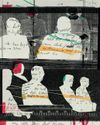
In 1926, Virginia Woolf wrote an essay about an innocent young art form: the silent cinema. Woolf argued that the movies were too literary. They would have to find their own artistic language, since they were currently imprisoned in a system of dead convention and mechanical semaphore: “A kiss is love. A broken cup is jealousy. A grin is happiness. Death is a hearse.” Once in a while, she had found herself in a darkened cinema with an apprehension of what film might achieve. “Through the thick counterpane of immense dexterity and enormous efficiency one has glimpses of something vital within,” she wrote. “But the kick of life is instantly concealed by more dexterity, further efficiency.”
In the same year, the English writer W. Somerset Maugham published “The Casuarina Tree,” a book of six short stories. Maugham was at the height of his success, as a great, and greatly rewarded, writer of immense dexterity and enormous efficiency. As his biographer Selina Hastings writes, “For much of his long life”—he died in 1965, at ninety-one—Maugham was “the most famous writer in the world.” He had the kind of celebrity that now attends actors, musicians, and criminal politicians. Wherever he went, his spoor was tracked by readers and journalists.
Denne historien er fra November 13, 2023-utgaven av The New Yorker.
Start din 7-dagers gratis prøveperiode på Magzter GOLD for å få tilgang til tusenvis av utvalgte premiumhistorier og 9000+ magasiner og aviser.
Allerede abonnent ? Logg på
Denne historien er fra November 13, 2023-utgaven av The New Yorker.
Start din 7-dagers gratis prøveperiode på Magzter GOLD for å få tilgang til tusenvis av utvalgte premiumhistorier og 9000+ magasiner og aviser.
Allerede abonnent? Logg på

GET IT TOGETHER
In the beginning was the mob, and the mob was bad. In Gibbon’s 1776 “Decline and Fall of the Roman Empire,” the Roman mob makes regular appearances, usually at the instigation of a demagogue, loudly demanding to be placated with free food and entertainment (“bread and circuses”), and, though they don’t get to rule, they sometimes get to choose who will.

GAINING CONTROL
The frenemies who fought to bring contraception to this country.

REBELS WITH A CAUSE
In the new FX/Hulu series “Say Nothing,” life as an armed revolutionary during the Troubles has—at least at first—an air of glamour.

AGAINST THE CURRENT
\"Give Me Carmelita Tropicana!,\" at Soho Rep, and \"Gatz,\" at the Public.

METAMORPHOSIS
The director Marielle Heller explores the feral side of child rearing.

THE BIG SPIN
A district attorney's office investigates how its prosecutors picked death-penalty juries.

THIS ELECTION JUST PROVES WHAT I ALREADY BELIEVED
I hate to say I told you so, but here we are. Kamala Harris’s loss will go down in history as a catastrophe that could have easily been avoided if more people had thought whatever I happen to think.

HOLD YOUR TONGUE
Can the world's most populous country protect its languages?

A LONG WAY HOME
Ordinarily, I hate staying at someone's house, but when Hugh and I visited his friend Mary in Maine we had no other choice.

YULE RULES
“Christmas Eve in Miller’s Point.”